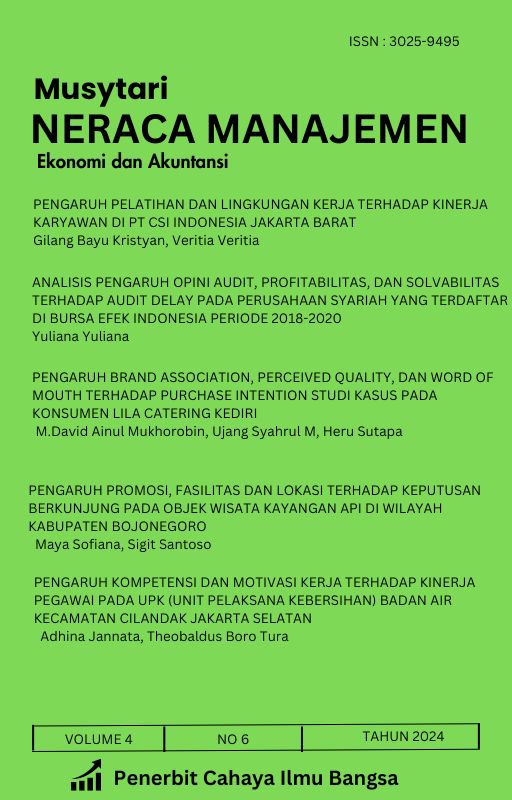PENGARUH KEPADATAN PENDUDUK TERHADAP INDEKS PEMBANGUNAN MANUSIA DI KAB/KOTA DI PROVINSI JAWA TENGAH TAHUN 2024
Published 2025-06-11
Keywords
- Population Density; Human Development Index; Central Java
How to Cite
Abstract
This study examines the effect of population density on the Human Development Index (HDI) in districts/cities of Central Java Province in 2024. The study uses official data from the Central Statistics Agency which reflects the demographic and human development conditions in the region. The analysis was carried out descriptively to describe the frequency distribution, central tendency, and variability of population density and HDI data. Furthermore, a simple linear regression test was applied to test the strength and direction of the relationship between the two variables. The results of the study revealed a significant positive relationship, where an increase in population concentration in an area contributed to an increase in HDI values. These findings suggest that population density can support improved access to public services and infrastructure quality, thereby playing a role in improving human development conditions. The implications of these findings provide an empirical basis for the formulation of integrated development policies, with a focus on managing population density and optimizing resources to achieve equitable development between regions.
References
- [1] Anggraeni Sihombing, L., Fadhilah Utami, C., Hak Cipta Karya Arsitektur yang Beredar Bebas di Dunia Maya, P., Siber Cerdika Internasional, P., Fadhilah Utami Badan Pengembangan Infrastruktur Wilayah, C., & Pekerjaan Umum dan, K. (2023). HIRARKI DAN DISTRIBUSI KOTA: PENYEBARAN, DAN KEPADATAN PENDUDUK SERTA IMPLIKASINYA TERHADAP INFRASTRUKTUR Lani. Jurnal Ilmiah Sosial Teknik, 5(2).
- [2] Angka, D. (2024). Provinsi Jawa Tengah Dalam Angka 2024. Badan Pusat Statistik Provinsi Jawa Tengah.
- [3] Badan Pusat Statistik. (2019). Indeks Pembangunan Manusia 2019. Badan Pusat Statistik, 53(9), 1689–1699.
- [4] Badan Pusat Statistik. (2024a). Indeks Pembangunan Manusia Menurut Kabupaten/Kota, di Provinsi Jawa Tengah 2024. Badan Pusat Statistik Prov. Jawa Tengah. https://jateng.bps.go.id/id/statistics-table/2/ODMjMg==/-metode-baru-indeks-pembangunan-manusia-menurut-kabupaten-kota.html
- [5] Badan Pusat Statistik. (2024b). Kepadatan Penduduk Menurut Kabupaten/Kota di Provinsi Jawa Tengah, 2024. In Badan Pusat Statistik Prov. Jawa Tengah. https://jateng.bps.go.id/id/statistics-table/2/MjIwNSMy/penduduk--laju-pertumbuhan-penduduk--distribusi-persentase-penduduk-kepadatan-penduduk--rasio-jenis-kelamin-penduduk-menurut-kabupaten-kota-di-provinsi-jawa-tengah.html
- [6] Gunandi, A., & Kismiantini. (2023). Penerapan Analisis Jalur Pada Faktor-Faktor yang Mempengaruhi Indeks Pembangunan Manusia di Indonesia. Jurnal Statistika Dan Sains Data, 1, 20–39.
- [7] Hayati, K. R., C, A. R., Firmansyah, M. F., & Sari, R. N. (2023). Pengaruh Tingkat Kepadatan Penduduk Yang Semakin Kompleks dan Terus Meningkat di Kota Surabaya. Madani: Jurnal Ilmiah Multidisiplin, 1(5), 2986–6340. https://doi.org/10.5281/zenodo.8045383
- [8] Marizal, M., & Atiqah, H. (2022). Jurnal Sains Matematika dan Statistika Pemodelan Indeks Pembangunan Manusia di Indonesia dengan Geographically Weighted Regression ( GWR ). Pemodelan Indeks Pembangunan Manusia Di Indonesia Dengan Geographically Weighted Regression (GWR), 8(2), 133–145.
- [9] Permana, R. S., Kismiantini, & Setiawana, E. P. (2024). Pemodelan Indeks Pembangunan Manusia di Provinsi Jawa Tengah Tahun 2022 Menggunakan Model Regresi Spasial dengan Pembobot Queen Contiguity dan K-Nearest Neighbor. Jurnal Statistika Dan Sains Data, 1, 48–64. https://journal.student.uny.ac.id/index.php/jssd

